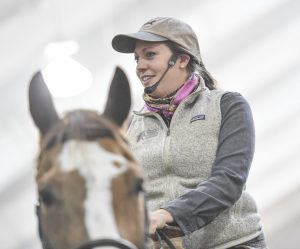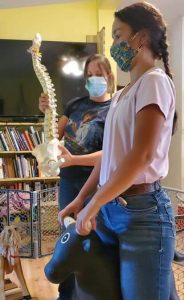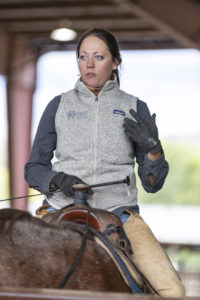
Skinner at the Best Horse Practices Summit
Editor’s Note: Amy Skinner is a regular guest columnist and has been a horse gal since age six. She has presented twice at the Best Horse Practices Summit and is the author of To Catch a Horse: Finding the Heart of your Horsemanship.
She rides and teaches dressage and Western. Skinner has studied at the Royal Andalusian School of Equestrian Art in Spain, with Brent Graef, Leslie Desmond, and many others. Visit her website here.
Amy writes:
One of the most common and damaging times for rider education starts, unfortunately, at the outset. Beginner-level school horses are often gentle but uneducated, and beginner instructors often have the least amount of experience. This creates lasting and unfortunate damage to riders and horses.
There is a prevalent idea in the horse world that an instructor of beginner riders is less skilled, and that a lesson horse suitable for a beginner rider needs to be gentle but not necessarily educated. People as well often look down on the beginner horse and teacher, as if their job is less difficult and less valuable. Instructors find themselves wanting to move beyond teaching beginners as soon as they get enough experience. Beginners also tend to feel apologetic for their limited skill set, often describing their experience and ability in self-deprecating ways.

Amy Skinner leads a presentation while experienced rider Nicole “rides”
I got my start as a teacher with beginner lessons, and I enjoyed them. But even as I learn more and appreciate the basics, I still love teaching beginners, maybe even more than I did at first. I find myself giving better descriptions of the basic elements. In turn, my students have better understandings and excel much faster than they used to.
I love to teach beginners the basics of expression, biomechanics, movement, horsemanship and other aspects. With an open mind and fresh perspective, they are often incredibly receptive to this information. It can be incredibly rewarding. Some of the best riders I’ve met were less experienced, at least at first.
With more experienced riders, teaching the basics can feel more difficult. They have ingrained habits that can be hard to break, and they carry a sense of pride in their ability. When tune-ups to their basics are needed, it can be hard on their self-esteem.
Contrary to conventional wisdom, a new rider can get a great start with knowledgeable instructors and horses who are not just gentle but well educated. They can get expert direction in the foundational pieces that will carry on through their riding careers. With an educated horse, beginners get a feel for the more finessed movements in riding.
An instructor who has a finely-tuned eye and experience teaching riders of all levels can set up a beginner for the stepping stones to move beyond rudimentary riding skills.

Amy Skinner at the BHPS 2018
Meanwhile, an inexperienced instructor teaching a new rider can short-change beginners’ learning experience. Learning to ride with the kick-and-pull mechanics as a foundation is tough to fix later. Riders who’ve spent hours cementing the muscle memory of pulling and kicking to maneuver the horse, or poor or incorrect muscle memory for their riding position will struggle to undo it later. Having an instructor with a keen eye for the basics of horsemanship and rider mechanics from the get-go will set the rider up for better riding sooner.
This kind of instructor can nurture a rider to move past the kick-and-pull phase to more quickly access a higher level of sensitivity and feel, and to develop these abilities instead of restricting them by encouraging mindless riding.
When I see a beginner with a disinterested instructor, a student riding endless laps on a stiff, gold-hearted horse, hearing the occasional directive to kick more, I feel sad for the horse world. The natural empathy and sensitivity of that rider – which likely drew them to horses in the first place – is systematically trained out with mindless directives. This beginner doesn’t get to experience fluidity of motion, connection, harmony or suppleness. If she don’t know these things exist, she is fated to create more disconnected partnerships throughout their riding life. The cycle of stiff horses and stiff, unfeeling riders is perpetuated by mindless instruction that emphasizes on control over feeling and connection.
What does it take to break the cycle?
- Better instruction for beginners and better educated horses.
- More time learning the in’s and out’s of horsemanship, horse psychology, movement, and care
- Less focus on getting to shows or moving up the levels.
- More time on the lunge line, getting confident in following the horse’s movement
- Less time learning to control the horse before understand the horse.
- Less circles and laps around the arena
- More time observing, listening, and thinking.
Beginner students taught optimally have a much better chance at getting along with horses, staying with riding long-term, and, hopefully, eventually becoming teachers of mindful horsemanship themselves someday.
Thank you! As an older beginner (60 when I started) I had both experiences. Finding my current instructor has been a fantastic experience. I didn’t know the difference until I found him. I’m so grateful.
So many important points as usual Amy! It’s funny because in good academic centers the same goes. The most knowledgeable and advanced professors (top of the heap) educators teach the new incoming students..It is only later when you get to be further along in one’s education you might be asked to rely on the “teaching assistant” if that makes sense. That’s assuming the knowledge is of quality to begin with. Such wonderful insights to this age-old experience.